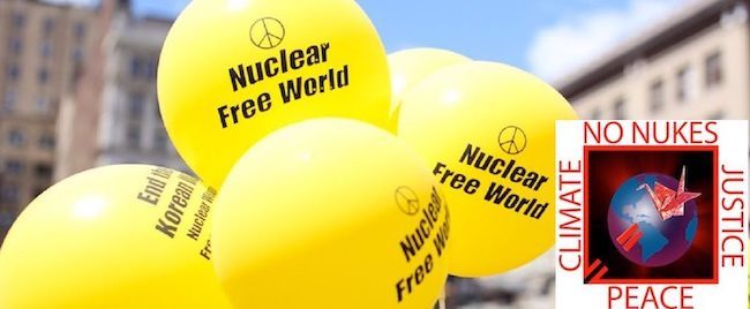By Santo D. Banerjee
NEW YORK (IDN) -– In a dramatic warning from 13 Nobel Prize winners about the existential dangers of nuclear weapons and climate crisis, the Bulletin of Atomic Scientists on January 23 set the hands of its iconic ‘Doomsday Clock’ to 100 seconds to midnight. [2020–04-30 | 03] CHINESE | JAPANESE | KOREAN | RUSSIAN
On April 25, during the Covid-19 crisis, over one thousand activists across the peace, climate, and social movements gathered online to take part in the first-ever virtual World Conference: Abolish Nuclear Weapons | Resist and Reverse Climate Change | For Social and Economic Justice.
The event as an in-person conference in New York coinciding with the NPT Review Conference, which was to take place at the United Nations headquarters in New York from April 27-May 22. But it is postponed to 2021 because of the Covid-19 pandemic. “Nevertheless, the energy and motivation of the in-person conference was not lost,” said an observer.
The virtual conference served as a starting point for bringing a variety of movements together for a more peaceful, just, and responsible world. A case in point was the participants’ commitment to “continue to work tirelessly” for a set of objectives.
These include Immediate fulfilment of Article 6 of the Treaty on the Non-Proliferation of Nuclear Weapons (NPT), which requires cessation of the arms race and the elimination of nuclear weapons. Equally critical is early entry-into-force of the Treaty on the Prohibition of Nuclear Weapons (TPNW) as an essential and reinforcing step towards a nuclear-weapons-free world.
The conference also emphasized the commitment of participants to campaign for an early establishment of a Middle East Zone Free of Nuclear, Chemical and Biological Weapons as agreed by the States parties to the NPT.
They will furthermore continue efforts for achieving regional détente processes to end conflicts and arms racing in all regions of the world including South Asia, North East Asia, and Europe.
Global disarmament with a just transition for workers in the weapons industry and a policy of détente that reduces conflicts and favours peaceful conflict resolution is essential is yet another goal they have set themselves.
They call for military budgets to be slashed worldwide, with those funds redirected to meet human needs and protect the environment. The 17 Sustainable Development Goals (SDGs) at the centre of efforts to redistribute resources from militarism to peace, can only be realized through disarmament, they add.
The International Peace Bureau (IPB), a co-organizer of the World Conference, underlines the significance of these commitments by highlighting that while military spending is on the rise, health budgets remain insufficient in confronting the Covid-19 pandemic.
The latest report by the Stockholm International Peace Research Institute (SIPRI) shows global military spending in 2019 at a new high of US$1,917 billion. Military expenditure has increased by 3.6% from 2018 and represents $252 for every person on the planet.
“The increase is evidence that the world is in a global arms race that benefits few and raises the likelihood of a global catastrophe. It sheds light on the effectiveness of military industries’ lobbying, particularly in Europe, North America, Asia, and Oceania. NATO’s military budget alone totals $1,035 billion and accounts for 54% of total global military spending,” says IPB.
The conference also calls for several fundamental changes. These include translating into reality the vision for the 20th century elaborated in the Charter of the United Nations.
“We are confronted with existential challenges: nuclear weapons and wars that can destroy the planet in short order and the creeping destruction caused by climate change, ecological devastation, and pandemic threats. Militarization is increasing dramatically in Europe and other parts of the world,” the participants say.
They add: 75 years after the atomic bombs were dropped on Hiroshima and Nagasaki and the worldwide cry of “never again”, the warnings of the Hibakusha must never be forgotten.
Seventy-five years after the end of the Second World War and the oath “never again to fascism – never again to war”; we must remain steadfast in our commitments.
Seventy-five years after the founding of the United Nations to end war; its charter and commitments must be honoured.
Fifty years after entry-into-force of the NPT, to end the nuclear arms race and achieve nuclear disarmament; its commitments must be fulfilled.
Besides, the world now suffering from millions of Covid-19 cases and hundreds of thousands of related deaths, the pandemic has illuminated national and international systemic weaknesses, policy failures and a profound lack of international cooperation.
“Yet, in crisis, there is an opportunity. The pandemic has also illustrated ways in which we can prepare for the inevitable future pandemics, as well as to reverse the threats posed by nuclear weapons and the climate crisis.”
The conference points out that the world is also confronted with an increasing number of authoritarian governments and the growth of far-right radicalism and fascist threats. Undemocratic, dictatorial politics increasingly influence and dominate the political climate in more and more countries around the world, endangering the lives of minorities and migrants. Even the most fundamental democratic rights are in danger. Democracy is in a deep crisis.
The conference participants go a step further and note that the world is confronted with the fact that governments and corporations – as well as individuals – are planet earth with ever-increasing intensity, “as if we could easily rectify the environmental degradation or move to another planet”.
“Man-made climate change is becoming a daily threat to life and survival, while other ecological disasters threaten our coexistence and the shaping of the future for humans, other animals, and plants.
“The beneficiaries of these developments are few, while the vast majority of people on Earth are affected and suffer. Millions of refugees have been generated by wars, injustice, and ecological disasters on a global scale.” [IDN-InDepthNews – 30 April 2020]
Image credit: World Conference




